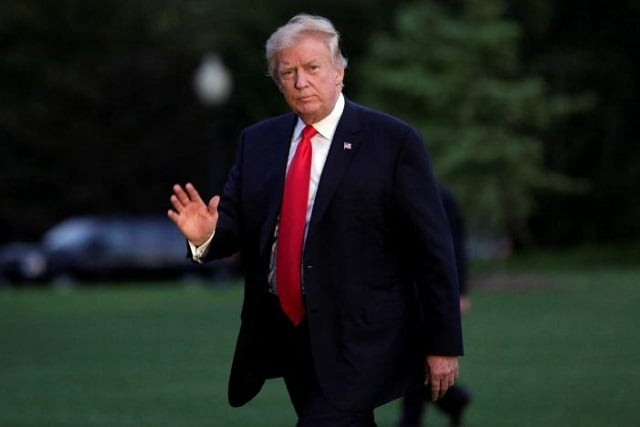Trump's push to replace Obamacare faces trouble as US Congress returns
Republicans have long criticized Obamacare as ineffective and a government intrusion in a key sector of the economy

U.S. President Donald Trump waves as walks on the South Lawn of the White House upon his return to Washington, U.S., from the G20 Summit in Hamburg, July 8, 2017. PHOTO: REUTERS
White House chief of staff Reince Priebus told Fox News Sunday that Trump, who made repeal and replacement of Obamacare a central plank of his 2016 campaign, still expected the Senate to pass a healthcare bill either before the scheduled start of Congress' August recess "or maybe a little bit into" the recess. Other Republicans voiced pessimism. "My view is that it's probably going to be dead," Senator John McCain of Arizona said of the healthcare legislation on the CBS program "Face the Nation."
Trump could be impeached for falsely accusing Obama, says Harvard professor
Some conservative senators, such as Ted Cruz of Texas and Rand Paul of Kentucky, have said they cannot support the proposal unless it goes further to repeal the 2010 Affordable Care Act, popularly known as Obamacare. Senate Majority Leader Mitch McConnell is weighing how to shore up support for the healthcare bill, which would repeal parts of Obamacare, former Democratic President Barack Obama's signature legislation, and get rid of tax increases that fund it.
The Republican-controlled House of Representatives in May passed its own version of a bill overhauling healthcare. McConnell warned at a luncheon in his home state of Kentucky last week that if Republicans were unable to pass their own replacement bill, they might need to work with Democrats to bolster the insurance markets created under Obamacare, according to the Associated Press.
During a week-long recess last week that coincided with the Fourth of July holiday, liberal groups organized town halls and protests and ran ads criticizing the proposal. Most Republican senators kept a low profile on the issue, including McCain, who traveled to Afghanistan to visit troops, and Senator Jeff Flake, a fellow Arizonan who faces a tough re-election fight next year.
Last week, groups such as the state chapter of Planned Parenthood and Ability 360, an advocacy organization for disabled people, participated in events that spotlighted the Senate bill, including a town hall in Phoenix. At the Phoenix event, there were empty chairs on a stage with placards for McCain and Flake, who were invited but did not attend. Arizonans such as Rosemary Dixon, who had a kidney transplant in 2015 and worries about how she will pay for her medication, spoke about the potential impact of the legislation.
Medicaid Cuts
Republicans have long criticized Obamacare as ineffective and a government intrusion in a key sector of the economy. But opponents deride the Republican healthcare bill as a giveaway to wealthy Americans who would see some tax increases rolled back.
Critics also warn the legislation would cause millions of poor and sick Americans to lose healthcare coverage. The Obamacare law expanded health insurance coverage to some 20 million people, in large part through an expansion of Medicaid, a government health insurance program for the poor and disabled.
Senators from states such as Ohio, Nevada and Arizona that expanded the Medicaid program under Obamacare are taking heat from Republican governors over the Senate bill’s proposal to phase out the expansion. In Arizona, for example, more than 400,000 have signed up for Medicaid since its expansion there and 1.9 million are now insured by the program.
Trump signs order to dismantle Obama-era climate policies
The Senate legislation would also drastically cut federal Medicaid spending beginning in 2025, repeal most of Obamacare's taxes, end a penalty on Americans who do not obtain insurance and overhaul Obamacare's subsidies to help people buy insurance with tax credits. The nonpartisan Congressional Budget Office, which assesses the impact of legislation, estimated 22 million people would lose health insurance over the next decade under the Senate bill.
In a separate report, it found the proposal would cut government spending on Medicaid by 35 percent come 2036. The Senate bill is unpopular with voters. Just 24 percent of adults approved of the proposal, according to a Reuters/Ipsos online opinion poll of 1,554 adults taken from July 2 to 6.
McConnell can only lose two Republican votes on the bill, relying on Vice President Mike Pence to cast the tie-breaking vote. But McConnell must do so with an eye on the 2018 congressional elections, ensuring he does not imperil the party's narrow majority in the 100-seat Senate.



















COMMENTS
Comments are moderated and generally will be posted if they are on-topic and not abusive.
For more information, please see our Comments FAQ